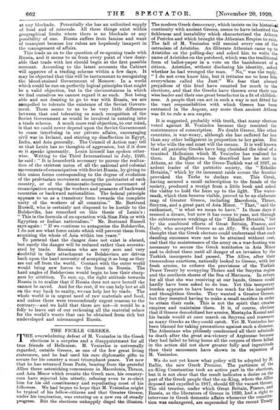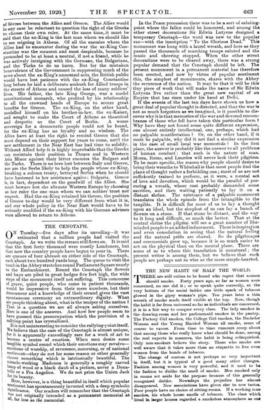THE FICKLE GREEKS.
MHE overwhelming defeat of M. Venizeloa in the Greek election is a surprise and a disappointment for all true friends of Hellenism. M. Venizeloa is universally regarded, oittside Greece, as one of the few great living statesmen, and he had used his rare diplomatic gifts to- secure for his country a most triumphant peace Yet now that he has returned 'from Paris, bearing from the grateful Allies those, astonishing concessions in Macedonia, Thrace, and Asia Minor which reunite the Greek race, his country- men htvve rejected him utterly, refusing even to re-elect him for his -old constituency and repudiating most of his followers. We had begun to hope that M. Venizelos might be typical of his fellow-citizens and that Greater Greece, under his inspiration, was entering on a new era of steady progress. But the elections unhappily dispel the illusion. The modern Greek democracy, which insists on its laistorical continuity with ancient Greece, seems to have inherited the fickleness and instability which characterized the Athens of Pericles and which -brought the Athenian Empire to ruin. The fall of M. Venizelos will remind every one of the ostracism of Aristides. An illiterate Athenian came up to Aristides on the polling-day and asked him to write the name of Aristides on the potsherd, which was the traditional form of ballot-paper in a vote on the banishment of a citizen. Aristides, without disclosing his identity, asked whether he had wronged the man. "No," was the reply. "I do not even know him, but it irritates me to hear him everywhere called the Just." We fear that absurd prejudices of this kind have counted for much in the elections, and that the Greeks have thrown over their one wise leader and their-one great benefactor in a fit of childish- ness. A people that can act in such a way is not fitted for the vast responsibilities with which Greece has been entrusted in the Aegean, any more than ancient Athens was fit to rule a sea -empire.
It is suggested, probably with truth, that many electors voted against M. Veniselos because they resented the maintenance of conscription. No doubt Greece, like other countries, is war-weary, although she has suffered far less than any other belligerent in proportion to her gains. But he who wills the end must will the means. It is well known that all patriotic Greeks have long cherished the ideal of a reunited Hellenism whie.,h M. VeMzelos has realized for them. An Englishman has described how he met in Athena, at the time of the Greco-Turkish war of 18,97, an ardent leader of the patriotic society, the " Ethnike Iletairia,," which by its incessant raids across the frontier ,provoked the Turks to declare war. This Greek, having secured a small subscription to the funds of the society, produced s. receipt from a little book and asked the visitor to hold the form up to the light. The water- mark, which then became visible, proved to be an elaborate map of Greater Greece, including Macedonia, Thrace, Smyrna, and a great part of Asia Minor. "That," said the enthusiast, "ii what we mean to have." In those days it seemed a dream, but now it has come to pass, not through the subterranean workings of the " Ftbnikelietairia," but by the combined efforts. of Great Britain, France, and Italy, who accepted Greece as an Ally. We should have thought that the Greek electors could understand that such dogging successes were not to be attained without cost, and that the maintenance of the army on a war-footing was necessary to seeure the- Greek territories in Asia Minor and to defend them until all danger of an invasion by the Turkish insurgents had passed. The Allies, after their tremendous exertions, naturally looked to Greece, with her fresh armies, to enforce the provisions of the Turkish Peace Treaty by occupying Thrace and the Smyrna region and the southern shores of the Sea of Harmers. In return for all that she was receiving at our hands, Greece could hardly have been asked to do less. Yet this temporary burden appears to have. been too much for- the impatient and thoughtless Greeks. They wanted a Greater Greece, but they resented having to make a small sacrifice in order to attain their elide. This, is not the spirit that< creates empires and maintains them. It is, of course, obvious that if Greece demobilized her armies, Mustapha Kemal and his bands would at once march. on Smyrna and massacre as many Greeks as they could catch. Yet M. Venizelos has been blamed for taking precautions against such a disaster. The Athenians who pitilessly condemned all their admirals to death after the great sea-victory of Arginusae because they had failed to bring-home all the corpses of those lolled in the action did not show greater folly and ingratitude than their successors have shown in the rejection ef M. Veniselos.
We .do not yet know what policy will be adopted by M. Rallis, the new Greek Premier. The ex-King Constantine took an active part in the ele,ctions, but it is not clear that the result indicates a, desire on the part of the Greek people that the ex-King, whom the Allies deposed and expelled in 1917, should fill the vacant throne; partisans of. the The old treaties, under which Great Britain, Filall?e, 11131' Russia, as the liberators of Greece in 1830, had ,a, right to intervene in Greek domestic affairs whenever the ccuistitu- tion was endangered, are superseded by the recent Treat,' of Sevres between the Allies and Greece. The Allies would in any case be reluctant to question the right of the Greeks to choose their own rider. At the same time, it must be said that the ex-King is the last man whom we should like to see reigning in Athens. Of all the enemies whom the Allies had to encounter during the war the ae-King Con- stantine was the meanest and most despicable, because he pretended to be at least a neutral, if not a friend, while he was actively intriguing with the Germans, the Bulgarians, and the nuke to do us harm. But for the mistaken benevolence of the Government in suppressing much of the news about the ex-King's unneutral acts, the British public would have lost patience with the ex-King Constantine long before he laid a deliberate ambush for Allied troops in the streets of Athens and caused the loss of many soldiers' lives. His father, the late King George, was a model constitutional monarch, who profited by his relationship to all the crowned heads of Europe to secure great benefits for Greece. The ex-King, on the other hand, modelled himself on his brother-in-law, the ex-Kaiser, and sought to make the Court of Athens as theatrical and despotic as the Court of Berlin. A worse sovereign for a democratic people could not be found, for the ex-King has no loyalty and no wisdom. The Allies have at least the right to remind Greece that she must depend on their support for years to come, until the new settlement in the Near East has had time to solidify. Without Allied help it is highly improbable that the Greeks can maintain their position in Thrace and in Western Asia Minor against their bitter enemies the Bulgars and the Turks. There 18-ncr love lost between Italy and Greece, nor are the Serbs likely to help the people whose ex-King, breaking a solemn treaty, betrayed Serbia *hen he should have hastened to her assistance against Bulgaria. Greece is, in fact, dependent on the goodwill of the Allies. She must beware lest she alienate Western Europe by choosing as her ruler the one man whom we can neither trust nor respect. Had the ex-King retained his throne, the position of Greece to-day would be very different from what it is, and our whole policy in the Near East would have to be seriously modified if the ex-King with his German advisers were allowed to return to Athens.



































 Previous page
Previous page